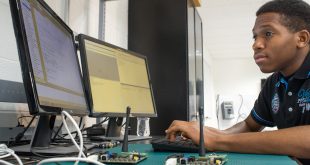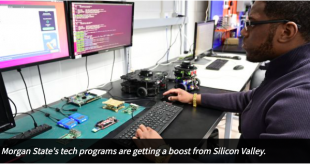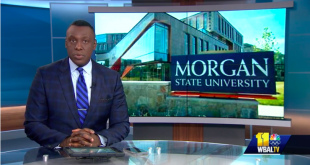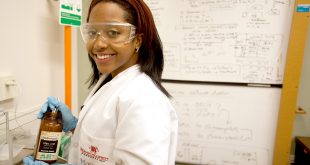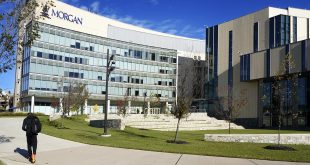The opportunity to do undergraduate research is what puts this program in a unique situation,” says Kristie Crumley,Ph.D.and dean of student affairs and student life at Carroll Community College. “Many community college students do not get the opportunity to do undergraduate research because most four-year schools don’t facilitate research until the junior or senior level coursework.” The STEM Scholars program gives students the chance to do research in their freshman year in the Science, Technology, Engineering and Mathematics (STEM) fields.
“All students in the STEM Scholars program take a seminar course each semester together,” says Crumley. “The seminars focus on professional development and networking within the STEM fields, field trips to different types of STEM professions and a guest speaker series. The final semester includes a STEM Scholars research project.” The program also comes with a $2,000 scholarship spread over four semesters.
If students are accepted into the program but don’t yet know which area of STEM they want to focus on, they are given the opportunity to explore. “I was always interested in math and physics which led me to consider pursuing engineering,” says Noah Simmons, a recent graduate of the program, but when he began at Carroll he wasn’t sure which avenue to explore. He immersed himself in not just his courses, but in many extra-curricular opportunities for STEM majors that were offered as well.
When reflecting on his time at Carroll, Simmons says, “I can attribute what I have been able to accomplish today to the opportunities that I have had here and the amazing help I have received from faculty.” Simmons is transferring to the University of Maryland (UMD) to study chemical and biomolecular engineering and has been awarded the Frederick Douglas Scholarship, the most prestigious scholarship that UMD awards transfer students.
“One of the seminar courses, ‘STEM scholars’ road trips’ includes trips to transfer schools, as well as STEM organizations, internship opportunities and potential jobs,” says Crumley. In the research part of the program, students do a literature review to research their topic of study and then participate in a hands-on lab project. “The research can be interdisciplinary or one-field specific,” says Crumley. One of the best experiences for Simmons was taking his last semester’s research to the Maryland STEM Conference and presenting what he had worked on with fellow students and faculty mentors.
The National Science Foundation S-STEM Scholarship Program at Howard Community College has similar opportunities for students to do research beginning in their first year. “We have a dedicated space for research,” says Patti Turner, professor and dean of science, engineering and technology at Howard, “and faculty who want to continue research and get students involved right away.” S-STEM Scholarships can provide up to $6,500 a year for students who qualify.
“S-STEM Scholars spend at least three hours a week on campus in the program,” explains Turner, “one hour of which is in the classroom and other hours within guidelines with the faculty mentor.” There are a wide variety of research projects underway and students from different departments often collaborate on a project. “Students can come up with ideas with guidance from their professors,” says Turner. “They are only limited by the equipment we have.”
Caitlin Beckjord, an environmental science major, is three semesters into a research project analyzing the streams on campus and loves getting to work with other students and faculty. “All the communications, planning and public speaking has given me confidence,” says Beckjord, who has presented at the Maryland STEM Conference and Greenfest as well as on campus.
Kathleen Hamilton, now a junior at the University of Maryland, College Park, is majoring in astronomy. While at Howard Community College, she spent three semesters as a S-STEM Scholar. “During the first I was lead theoretical researcher on a team investigating resonance and the rise of chaos in double pendulum systems,” says Hamilton.“The next semester we distilled and presented our findings at two conferences, and in the third semester I worked one-on-one with my research advisor to prepare an official research paper for publication.” Getting published as an undergraduate will help her when it comes to graduate school. In the meantime, her experience has prepared her to be a peer mentor at UMD.
Students begin with a lab-based course tolearn about research, funding and collaborating among other skills. With the help of their faculty advisor, they read papers on their topic, learn instrumentation and how to write an abstract for their project. In their second year they continue their data collection, writing papers and presenting at conferences. “We want students that go on to four-year colleges to be confident in their presentation skills,” say Turner, “and know how to ask questions.”
Knowing how to ask questions and how to distill the answers are part of a project being carried on by graduate student researchers from Morgan State University. “Morgan’s role is as an external evaluator,” says Kim Sydnor, Ph.D., dean of the school of community health and policy, speaking of the work they are doing on the Future Baltimore project. This grew out of the collaboration of Bon Secours and Kaiser Permanente in the West Baltimore neighborhoods.
“We have a history with Kaiser doing other work on community health assessments,” says Sydnor. “The research we will be doing on this project will help them understand the big picture. We look at the whole, a broad view and the impact processes have on the individual and the community.”
The Future Baltimore project includes renovating a library into a community resource center for Bon Secours Community Works programs. Kaiser and Bon Secours are doing this in partnership with the community, and they rely on community feedback to guide them. The goal is the improve the health of the community in all aspects: physical, mental, social and economic.
“Students from Morgan will be doing a multilevel evaluation on services to the community,”
 Morgan State University Newsroom Morgan State University
Morgan State University Newsroom Morgan State University
